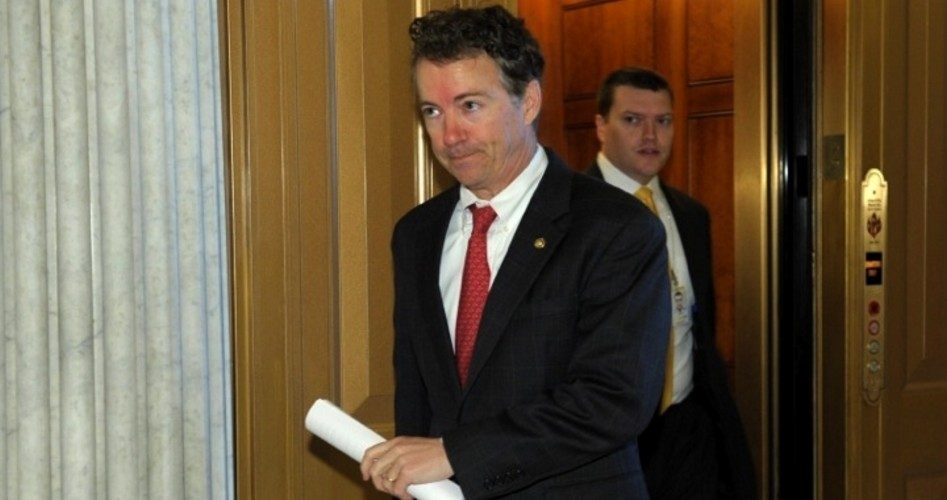
On his first trip to Israel, Sen. Rand Paul (R-Ky.) said Monday that all U.S. foreign aid should be gradually eliminated, including the roughly $3 billion sent annually to the country he was visiting.
Speaking at the Jerusalem Institute for Market Studies, a liberty-oriented Israeli think tank, Paul “acknowledged he was expressing a ‘minority opinion’ and doubted Congress would end foreign aid in his lifetime,” according to the Associated Press.
“It’s unlikely anything changes,” he said, “but I think it is worth discussing.”
Paul, who was recently appointed to the Senate Foreign Relations Committee, laid out the reasons why he believes winding down foreign aid would benefit both the United States and Israel.
First, he said, was the practical matter of whether the United States could afford to keep doling out aid when it is already running trillion-dollar annual deficits.
Although Paul stated “that the United States is and always will be a friend of Israel” (in the words of the Jerusalem Post), he expressed concern that “it will be harder to be a friend of Israel if we are out of money. It will be harder to defend Israel if we destroy our country in the process. I think there will be significant repercussions to running massive deficits … you destroy your currency by spending money you don’t have.”
Paul added that he finds borrowing from foreign countries to fund foreign aid particularly irrational.
“To me it has always been about whether it makes sense for me to borrow money from China to give to Pakistan,” he explained.
Paul proposed gradually reducing all U.S. foreign aid, with Israel being among the last recipients of such aid to feel the pinch.
“I’m all for gradualism,” he said. “I would start a little more quickly with those who are enemies of Israel, and enemies of the U.S. I would like to see their aid end more quickly. With regards to Israel, it could be a gradual phenomenon.”
In this he echoed the words of Israeli Prime Minister Benjamin Netanyahu, who told Congress in 1996 that Israel needed to “achieve economic independence” from the United States by “gradually reducing the level of” U.S. aid — a speech that Paul cited twice in his remarks.
The second reason ending foreign aid would be beneficial, Paul said, is that making Israel self-sufficient would give it a free hand to make its own policy without having to seek permission from Washington. According to the Post:
Paul asked whether “our aid hampers Israel’s ability to make its own decisions as it sees fit,” and whether “our money sometimes clouds the sovereignty of Israel.”
The senator … said he was often asked what Israel should do about the settlements, Gaza and Iran.
“Well, America should and does have an opinion on these things,” he said. “But ultimately these are decisions you have to make. I don’t think you need to call me on the phone and get permission to stop missiles raining down from Gaza.”
Paul said the U.S. aid has led many in Israel to think “they have to call people in America for permission to defend itself.”
A third reason to end foreign aid is that it is creating an arms race in the Middle East that could come back to haunt Israel, Paul averred.
“I’m concerned that some of the weaponry that we are currently giving to Egypt may one day be used against Israel,” he said.
One more reason to stop foreign aid, Paul maintained, is that it essentially amounts to corporate welfare for the U.S. defense industry. Of the $3 billion Israel receives from the United States each year, 74 percent of it must be spent on U.S.-made weaponry, which means “that one industry — defense — is benefiting from taxes taken from 300 million people,” as the Post paraphrased his remarks. He said he was not opposed to direct arms sales to Israel, only sales via taxpayer-funded aid. He also noted that removing the requirement that Israel purchase much of its weaponry from the United States would help stimulate the country’s own defense industry.
Paul met Monday with Netanyahu, Israeli President Shimon Peres, and other Israeli leaders. On Tuesday he was scheduled to travel to Jordan to meet with King Abdullah II and Palestinian Authority President Mahmoud Abbas. The trip has “fuel[ed] speculation of a likely presidential campaign” by the senator, writes the Post.
Such a campaign could be quite interesting. Having a candidate in the race who favors eliminating, rather than just tweaking, foreign aid might force other candidates to go on the record about the subject themselves. Then voters would discover which ones support the Constitution, which makes no provision for foreign aid, and which prefer to rob American taxpayers to give money and arms to foreign governments.


